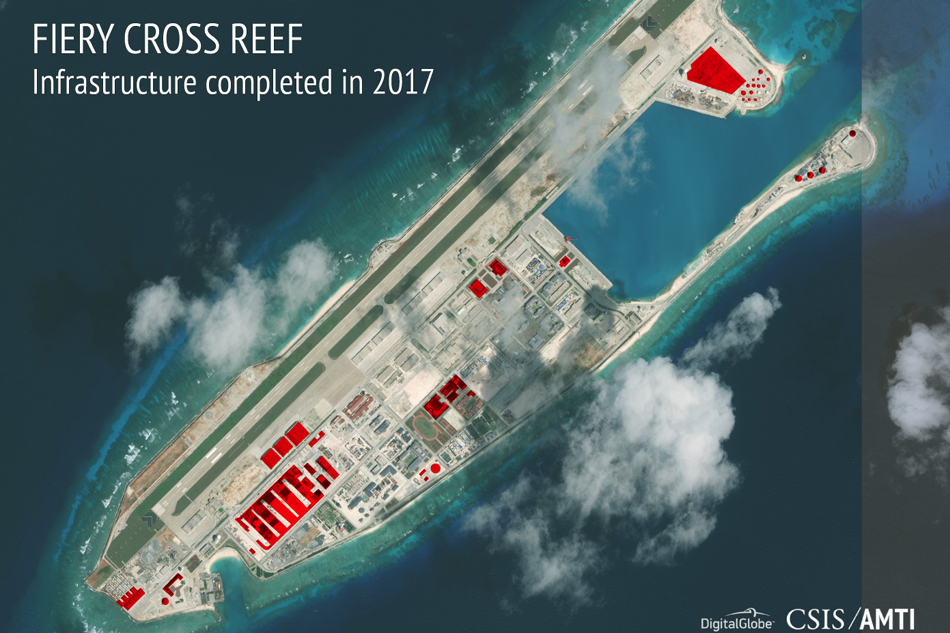China rejection of arbitral ruling immaterial, says Palace spokesman | ABS-CBN

Welcome, Kapamilya! We use cookies to improve your browsing experience. Continuing to use this site means you agree to our use of cookies. Tell me more!
China rejection of arbitral ruling immaterial, says Palace spokesman
China rejection of arbitral ruling immaterial, says Palace spokesman
Pia Gutierrez,
ABS-CBN News
Published Jan 16, 2018 01:05 AM PHT
Whether or not China accepts the international tribunal's ruling on the South China Sea is immaterial under international law, Presidential Spokesman Harry Roque said Monday.
Whether or not China accepts the international tribunal's ruling on the South China Sea is immaterial under international law, Presidential Spokesman Harry Roque said Monday.
Roque was answering the criticisms of Supreme Court Associate Justice Antonio Carpio, who has assailed the Philippine government's decision to allow China to conduct research explorations in Benham Rise, amid China's clear disregard of the Permanent Court of Arbitration's decision validating the Philippines' maritime entitlements in the South China Sea.
Roque was answering the criticisms of Supreme Court Associate Justice Antonio Carpio, who has assailed the Philippine government's decision to allow China to conduct research explorations in Benham Rise, amid China's clear disregard of the Permanent Court of Arbitration's decision validating the Philippines' maritime entitlements in the South China Sea.
The spokesman said the decision of the arbitral tribunal is considered a binding legal principle, whether countries agree to it or not.
The spokesman said the decision of the arbitral tribunal is considered a binding legal principle, whether countries agree to it or not.
"Well unang-una po 'no, hindi ko maintindihan why China should recognize the arbitral ruling," Roque said.
"Well unang-una po 'no, hindi ko maintindihan why China should recognize the arbitral ruling," Roque said.
ADVERTISEMENT
"In international law, the decision itself is the implementation of the law because that's a statement of the rights of the parties which cannot be extinguished and which does not depend on any country accepting its binding nature...'Yan ang nature of international law.
"In international law, the decision itself is the implementation of the law because that's a statement of the rights of the parties which cannot be extinguished and which does not depend on any country accepting its binding nature...'Yan ang nature of international law.
"So, hindi ko talaga maintindihan, with all due respect to Justice Carpio, he really is recognized as the intellectual heavyweight in the court 'no, why he insists that any country including China must accept it. Whether or not they accept it, it's there and that's the binding nature of international law. Why is it binding on China whether or not it accepts? Because it's there."
"So, hindi ko talaga maintindihan, with all due respect to Justice Carpio, he really is recognized as the intellectual heavyweight in the court 'no, why he insists that any country including China must accept it. Whether or not they accept it, it's there and that's the binding nature of international law. Why is it binding on China whether or not it accepts? Because it's there."
He added that it is not for the Philippines to compel any party to recognize the tribunal ruling.
He added that it is not for the Philippines to compel any party to recognize the tribunal ruling.
President Duterte earlier said his Chinese counterpart had warned him there would be war if Manila tried to enforce an arbitration ruling and drill for oil in a disputed part of the South China Sea.
President Duterte earlier said his Chinese counterpart had warned him there would be war if Manila tried to enforce an arbitration ruling and drill for oil in a disputed part of the South China Sea.
China has built several artificial islands in the South China Sea and equipped them with runways, missile systems, and communication facilities.
China has built several artificial islands in the South China Sea and equipped them with runways, missile systems, and communication facilities.
It also seized control of Scarborough Shoal off Zambales province following a standoff with the Philippine Navy over Chinese poachers caught in 2012.
It also seized control of Scarborough Shoal off Zambales province following a standoff with the Philippine Navy over Chinese poachers caught in 2012.
Roque said that he could not understand why Carpio would bring up the issue of the tribunal ruling when the Philippines' sovereign rights to Benham Rise have never been contested.
Roque said that he could not understand why Carpio would bring up the issue of the tribunal ruling when the Philippines' sovereign rights to Benham Rise have never been contested.
"I do not know the relevance really of the arbitral decision to Benham Rise because that's not part of the controversy. So, to even confuse the arbitral decision with Benham Rise is wrong. It has never been contested. It was awarded to us by the UN Commission on the Extended Continental Shelf," he said.
"I do not know the relevance really of the arbitral decision to Benham Rise because that's not part of the controversy. So, to even confuse the arbitral decision with Benham Rise is wrong. It has never been contested. It was awarded to us by the UN Commission on the Extended Continental Shelf," he said.
ADVERTISEMENT
ADVERTISEMENT


